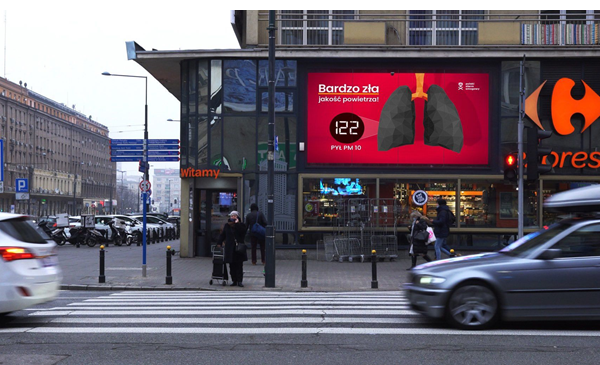The problem
Rybnik, a city in Poland’s Silesia region, had historically experienced high air pollution levels. Once known as the “smog capital of Poland”, the city is situated in a coal-mining region. The city’s economy is based on coal, with many residents who are current or former miners.
The air quality was particularly affected by smog during the winter months. Coal was burned to heat homes and public buildings. This widespread use of outdated and inefficient coal stoves releases harmful particles into the air. Residents frequently suffered from respiratory issues and other health conditions.
The doctor told me that it was not an infection, that it was just the quality of air in Rybnik. When I run in the evenings, I get a cough that basically does not go away all winter.
Emil Nagalewski, Silesia Coordinator, Polish Smog Alert
In 2017, the pollution levels became so extreme that the city authorities had to close schools. The smog was palpable and could be seen hanging in the air.
The solution
Faced with the escalating health crisis, local residents like Emil Nagalewski embarked on a mission to clean Rybnik’s air. Over 10 years ago, Polish Smog Alert, a grassroots advocacy group, began raising awareness about air pollution and proposing concrete solutions to alleviate the problem.
The campaigners started with awareness-raising initiatives to educate citizens about the problem, including a large display with white artificial lungs that turned black from air pollution. They utilised data from state air quality monitoring stations to provide clear evidence to the city authorities that coal-burning stoves needed to be replaced.
To address their air pollution, the City of Rybnik authorities agreed to implement a successful multi-faceted approach that included:
- Replacing old stoves in residential homes with modern heating installations, including renewable energy sources.
- Financial subsidies to help residents afford the transition to cleaner heating. Residents also benefited with technical help and support with financial paperwork.
- Controls and inspections by local authorities to ensure citizens are complying with the Silesian region’s anti-smog resolution.
Polish Smog Alert cooperated with the city, as well as regional and national authorities, to ensure that the proper legislation, financial programmes and control mechanisms were put in place to streamline the process of coal boiler replacement. Polish Smog Alert supported city authorities to deploy the subsidy programme for Rybnik’s residents to help them replace their coal boilers and enforce the antismog resolution banning the use of the most polluting coal and wood boilers. Over the last decade, almost 10,000 old coal boilers were eliminated from the city.
Rybnik shows that a lot can be achieved if authorities are open and cooperate with citizens, listening to their concerns and needs. Given that the changes in Rybnik took place over a decade, it also shows the value of being consistent in policy implementation. The positive change that we are experiencing in Rybnik would not be possible without either the push from the city’s residents or the authorities’ willingness to work together with local activists and NGOs like Polish Smog Alert.
Emil Nagalewski
Rybnik City Council also needed support to plan their energy transformation and replace the old coal stoves in public buildings. Forum Energii’s LeadAir programme supports mayors, city officials and residents with the knowledge to improve air quality and propose tailor-made local solutions.
With the support of the LeadAir project, Rybnik obtained funding for renewable energy investments in more than a dozen public buildings. 18 kindergartens will soon use low-emission heat sources. LeadAir also supported Rybnik to create an ambitious plan for the city’s energy transition by 2040, which would reduce air pollution to zero and significantly cut greenhouse emissions from buildings by 2040. It is a roadmap for action for the next 17 years.
The impact
Rybnik’s transformation from one of Poland’s most polluted cities to a leader in air quality improvement demonstrates the power of coordinated action and community involvement.
Rybnik’s air quality change:
130 smogs days in 2010
16 smog days in 2023
Rybnik was able to reduce its annual number of “smog days” – days when air quality is at hazardous levels and pollution can be seen in the air. In Rybnik, these days have decreased from 130 days a year to just 16 days a year.
Everyone got involved in the fight against smog and we managed to win this fight. The LeadAir project helped us a lot in this, because we opened up to new projects, new opportunities.
Wojciech Kiliańczyk, Deputy Mayor, Rybnik City Council
Rybnik’s success has broader implications for other cities in Poland and beyond. With over 50 initiatives in its network, Polish Smog Alert can hold Rybnik up as an inspiring example of urban action.
Through the LeadAir project, Rybnik is working with 45 cities to jointly propose systemic changes to improve air quality across the country. The city’s transition away from coal, despite its deep-rooted mining traditions, shows that change is possible even in the most challenging environments.
In the LeadAir project, the determination of Rybnik’s local authorities and officials stood out amongst other cities. The city became a leader, because it had the courage to implement ambitious campaigns, consistently provided support to residents in obtaining subsidies for the replacement of old boilers, and controlled those who did not meet the anti-smog resolution. I hope that other cities follow their example.
Anita Cieślicka, Cities Programme Director, Forum Energii
Rybnik is an example that inspires cities, local communities and NGOs to take action to improve air quality. If more coordinated and effective action took place in Poland, the quality of life and health of many people would be improved.


